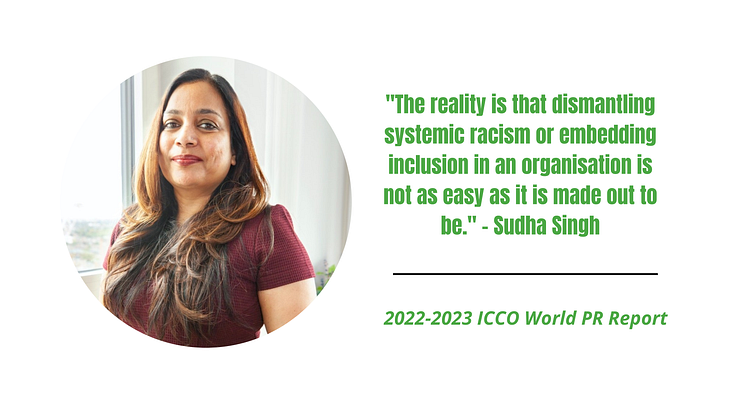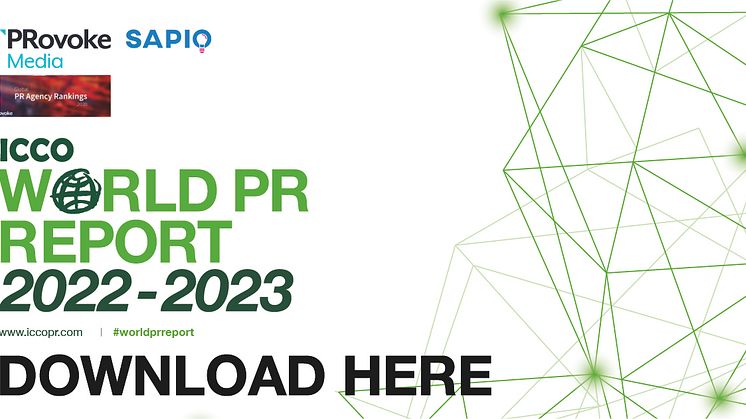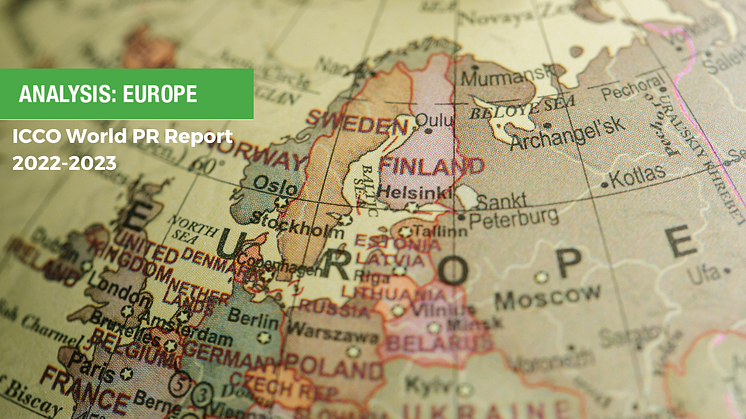
Blog post -
DEI is not a sprint or a marathon, it is not a sport! It is a social justice issue.
By Sudha Singh, Founder, The Purpose Room, Podcast Host, The Elephant in the Room, Co-Chair, PRCA Equity & Inclusion Advisory Council, and Founding Member, PRCA Race & Ethnicity Equity Board (REEB)
For more insights download the full 2022-2023 ICCO World PR Report HERE.
Research and anecdotal evidence indicates that progress has by and large stalled, that organisations have focused on the quick wins - to be seen to be on the right side of history and public opinion. There has been distinct effort on increasing diverse hires, on numbers but missing out the equity and inclusion piece by a long mile. All this because organisations have not factored in the financial commment, manpower and time required for real change.
However, data from the recent ICCO World PR Report indicates that it is not all doom and gloom, there is heightened awareness about inequalities faced by marginalised groups. The good news is that more agencies (79% in 2022 as compared to 55% in 2021) than ever before have a DEI policy and a dedicated person (66%) in place for D&I. The bad news - DEI polices at the end of the day can just be a tick in the box. And the reality is that over a quarter of these persons are not trained specifically to deliver on their role, which seems rather counterintuitive - it’s like setting them up and any DEI initiative for failure.
In terms of trends, there is no specific pattern to be discerned in different geographies. The UK performs the best on percentage of organisations with a DEI policy at 98%, followed by Latam (93%), Africa (84%), North America (86%).
Surprisingly Europe is at the bottom of the table at 55% - not great news for a geography that prides itself on inclusion. The other positive trend is that 18% of those surveyed have introduced measurement this year. This has been the big missing piece - without measurement there can be no accountability and it would be difficult to discern the impact of any initiatives. For change to be substantive and sustainable, we need more organisations to embed measurement into the design of their DEI programmes.
Despite the disproportionate focus on diverse hires, numbers and representations, only 30% of PR professionals believe the people working within their industry reflects the ethnic demographics of the communities they serve. And only 13% believe that the industry is highly representative. The statistics are disappointing and should be taken as a wake up call by leaders - numbers on their own are not going to help us remove inequalities, hiring diverse talent on its own is not the magic fix. HR-focused writer Riia O’Donnell describes it this way, “If diversity is the noun, then inclusion and belonging are the verbs that make it happen. You can hire as many people from disparate backgrounds as you like, but if they don’t believe they belong, or if their points of view are not included in the culture, you’re just checking off items on a list.”
Elsewhere in the report, talent retention comes up as one of the biggest challenges faced by agencies across geographies at 59% up 7% from last year. Are these figures indicative of the absence of workplaces that foster belonging; or cultures of microaggressions; or pay inequity? Unfortunately, for the longest time organisations have been focusing on diversity as a way to correct institutional and historic inequalities. Organisations need to focus on equity inspired designs for bringing about that change - to creating equitable workplaces where talented people can thrive, no matter where they come from, what they look like. It is important to understand that Inclusion/belonging, is an outcome and has diversity at its core - do people feel valued, can they bring their true self to work? What is their experience of the workplace? Do they belong?
It is no coincidence that clients are prioritising sustainability and the environment (62%), followed by diversity and inclusion (45%). Clearly, this is in line with global trends, they are responding to the growing demand from employees/customers to commit to a higher purpose and drive societal change. In this decade of reporting, it is crucial that as an industry, we step up, move beyond talking about DEI as ‘nice to have’ and frame it as a fundamental building block of social justice and a human rights concern.
We live in a world in a state of constant turmoil, increasing inequalities of income and access. As advisors to C-Suite it is our responsibility to maintain momentum to banish discrimination, in equality and inequity from our industry. The time for excuses is gone, if as an industry we want to thrive, innovate, be sustainable and be able to attract and retain diverse talent - it is important that we
speak as one on this issue and hold ourselves accountable. The task is not onerous if we as an industry are purpose led and keep our eyes fixed on the prize : fairer workplaces and a fairer society.
Here are some actions to move the needle…
1) The homogeneity check, can you be accused of homophily? Do all employees look similar; come from similar backgrounds - education, wealth? Broaden the talent pool; be creative about accessing diverse talent; have inclusive job adverts and create a culture where employees feel they can speak up and belong.
2) Who is in the leadership team: If everyone looks similar create a shadow board of diverse employees. If junior people from underrepresented communities do not see people like them, in leadership positions they are not going to stick around.
3) Pay transparency and fairness: Do your job ads have salary details? Are you paying on par with industry standards or below?; Have you taken into account the cost of living crisis?; Do you pay your interns and apprentices?
4) Have you aligned your DEI vision with your organisational/business purpose?: We measure business success through client wins; profits and employee retention. How do you measure your DEI success? Align the KPIs with business purpose and leadership.
5) Collaborate: Are you aware of industry benchmarks and best practice?; Are you a part of an industry body? Do you collaborate
with your peer group to solve problems? - You don’t have to do it on your own: Hire an external expert to take you on the journey.
6) And last but not the least put your vision out in the open. Talk about it, talk about the challenges, talk about the failures, talk about the wins and how you are going to persevere to build an inclusive industry.
For stats and additional industry insight, download the full ICCO World PR Report HERE.




